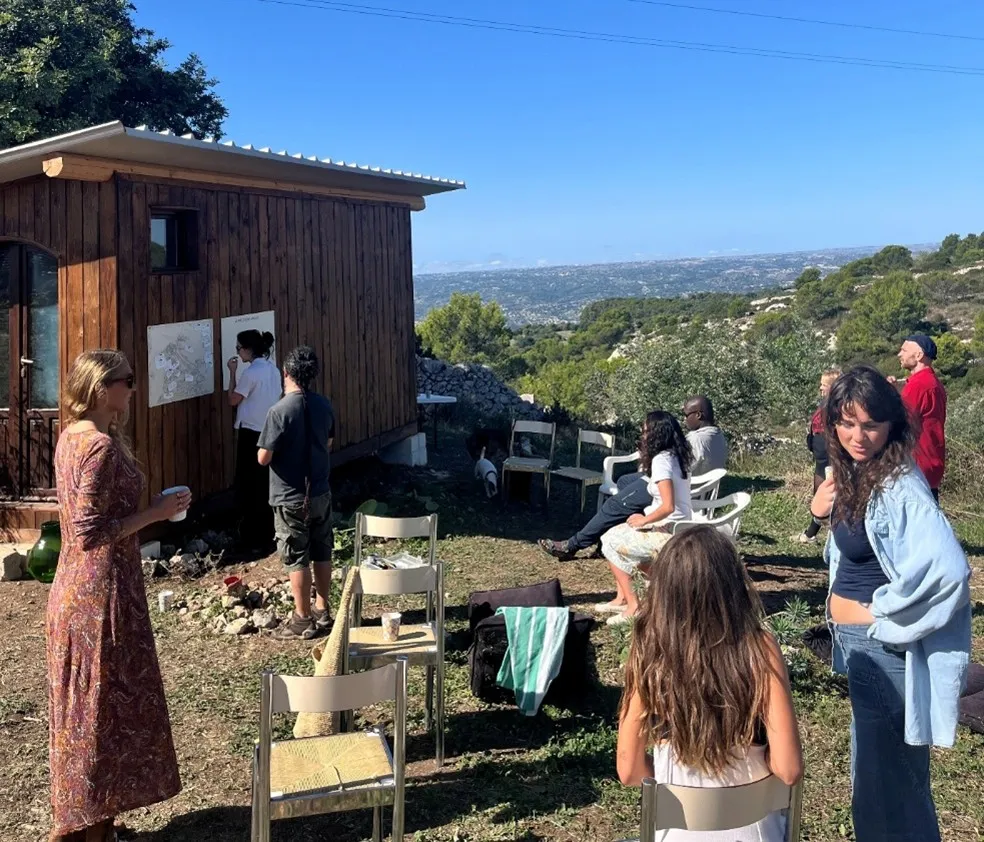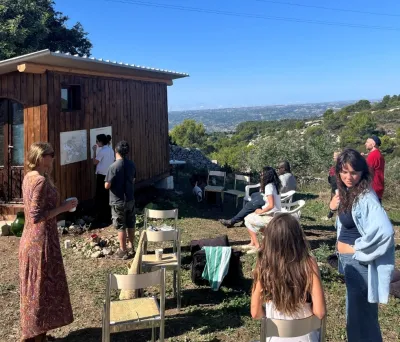Summary
Rural Radicals is a transnational initiative that revitalises rural areas through creative entrepreneurship and cultural placemaking. It supports the adaptive re-use of vacant buildings and fosters collaboration between urban creatives and rural communities. Working across five countries, the project combines participatory design, policy engagement, and knowledge exchange.
Its hybrid funding model and hands-on methods make it financially and environmentally sustainable. The initiative has built a growing European network of rural cultural hubs, influencing local policy and inspiring wider replication.
Results
- Over 300 creative professionals from over 10 countries have actively participated in in-person events, workshops, and exchanges organised by Rural Radicals.
- The initiative has reached thousands of people through online platforms, including social media, feature articles, and a dedicated webinar series on rural cultural entrepreneurship.
- The redevelopment of De Rakhorst watermill in the Netherlands was initiated through a co-creative process, leading to its handover for use as a community-based cultural space.
- In South Tyrol, the strategic partnership with BASIS has influenced cultural policy discussions at the regional level, supporting the recognition of culture in socio-economic development.
- In Caramulo, Portugal, the co-design process led to the opening of the village’s first co-working space and initiated a network of local and national partners to support future cultural and entrepreneurial activity.
- A growing transnational network of rural creative hubs is being established, enabling ongoing knowledge exchange and collaboration across regions and disciplines.
Resources
Documents
Context
Rural Radicals operates in a range of European rural areas that face persistent challenges such as declining populations, vacant heritage buildings, limited cultural infrastructure, and weak connections between local governance and the cultural and creative industries (CCIs). There is a need to reimagine rural development beyond agriculture by integrating CCIs into long-term territorial strategies. CCIs can unlock rural communities' ability to harness innovation, strengthen social cohesion, and develop sustainable economic opportunities.
At the same time, many young people and professionals living in urban areas are looking for alternative ways of life due to rising housing costs, stress-related health concerns, and a desire to reconnect with community and the environment. However, this transition is not always supported by clear pathways or infrastructure in rural regions.
Rural Radicals was created to respond to these intersecting trends by developing frameworks that support creative entrepreneurship in rural areas, with a particular focus on adaptive re-use, cultural innovation, and urban-rural collaboration.
Objectives
- Support rural revitalisation through creative and cultural entrepreneurship;
- Enable adaptive re-use of vacant buildings into sustainable cultural spaces;
- Facilitate knowledge exchange and collaboration between urban and rural creatives;
- Promote inclusive placemaking and participatory design;
- Embed cultural strategies into rural policy and development frameworks;
- Facilitate alternative finance matchmaking for rural creative initiatives.
Activities, key actors, and timeline
Since its creation in 2023, Rural Radicals has implemented several major initiatives:
- In 2023, Rural Radicals supported the social innovation hub BASIS Vinschgau Venosta in South Tyrol, Italy. The collaboration involved co-developing and launching the ‘Breaking the Silos’ symposium series to foster dialogue between cultural actors, institutions, and policymakers. The initiative was supported through the Creative Europe NightSchool project and the New European Bauhaus Ignite programme.
- In the Netherlands, the organisation led a participatory transformation of the historic De Rakhorst watermill into a creative hub. This included policy mapping, multi-stakeholder workshops, and co-creation sessions with local residents, heritage experts, and the municipality, resulting in a shared vision for future use.
- In Sicily, Italy, Rural Radicals facilitated an envisioning workshop at Meraki, an emerging rural artist residency. The workshop brought together 20 creatives from across Europe and focused on long-term sustainability models, collaborative curation, and social impact of rural residencies.
- In 2022, Rural Radicals collaborated with the village of Caramulo, Portugal – once a prominent sanatorium resort known for its striking architectural heritage, now facing underuse and population decline. Through workshops and community engagement, the project supported the co-creation of a long-term vision for 2030.
- The organisation plans to launch in late 2025 a transnational cooperation project under the LEADER programme. The project aims to activate vacant rural properties in Romania, Finland, and the Netherlands and support local development through creative entrepreneurship, including mapping underused assets, running knowledge exchange sessions, and testing new collaborative models.
- Throughout 2023–2025, Rural Radicals also delivered online and offline workshops, talks, and a webinar series on alternative financing for rural adaptive re-use. These activities targeted cultural entrepreneurs and rural changemakers, providing them with practical tools and peer-learning opportunities.
Success factors/lessons learnt
- The ability to work trans locally while adapting to the local context has been central to the initiative's success. Rural Radicals customises its approach to each community, respecting local dynamics while bringing in fresh perspectives.
- A strong commitment to partnership building has enabled Rural Radicals to act as a bridge between top-down policy structures and grassroots creativity. This has enhanced project relevance and impact.
- Long-term engagement and trust-building have proven essential. Rural Radicals invests time in building relationships with local actors and ensures that co-creation is embedded throughout its work.
- Culture is treated not merely as an aesthetic or entertainment factor, but as an infrastructural tool for inclusive regeneration, placemaking, and economic development. This conceptual shift has helped reposition culture as a strategic asset in rural policy.
- Financial sustainability is maintained through a hybrid funding model, combining European project grants with consultancy and co-created services, enabling both experimentation and continuity.
- Environmentally, the emphasis on adaptive re-use of buildings, circular thinking, and local sourcing ensures alignment with sustainability principles and climate goals.
- Key transferable insights include: linking creative talent with underused rural assets; participatory methods in design and decision-making, and networks to support rural innovation and resilience.
Contacts
- Ella Overkleeft, hello@ruralradicals.com, +31 627403989

